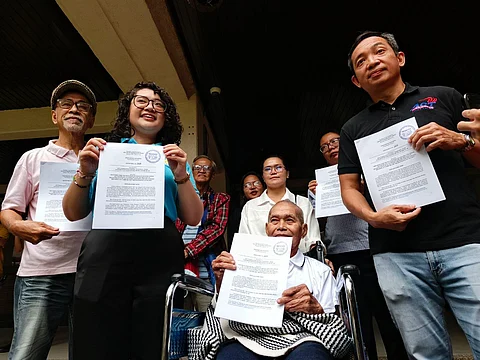
- NEWS
- the EDIT
- COMMENTARY
- BUSINESS
- LIFE
- SHOW
- ACTION
- GLOBAL GOALS
- SNAPS
- DYARYO TIRADA
- MORE

Militant lawmakers urged Congress on Thursday to give due priority to a bill seeking to allow the release on recognizance of persons deprived of liberty (PDL) on grounds of fragile health and advanced age.
House Bill 2066, filed by ACT Teachers Rep. Antonio Tinio and Kabataan Rep. Renee Co, aims to amend Republic Act 10389, or the Recognizance Act of 2012, to include elderly, sickly, pregnant, or nursing PDLs among those eligible for release on recognizance, or without having to post bail.
The bill is named after Antonio Molina, a 67-year-old farmer and political prisoner diagnosed with Stage 4 abdominal cancer, who was allegedly denied compassionate release despite pleadings that he only had six months to live.
He was arrested on 4 October 2019 along with six other members of a human rights organization for alleged fabricated charges. Subsequently, he died on 18 November 2021 of cardiac arrest just hours after being brought to the hospital.
The measure also cited the case of 81-year-old Prudencio Calubid Jr. suffering from chronic kidney disease, arthritis, and gout. Calubid was already out of jail since June after being imprisoned for six months in Manila City Jail for an alleged mistaken identity.
However, the government, through the Office of the Solicitor General (OSG), is still appealing the court’s decision. The OSG insisted that Calubid was the same suspect wanted for multiple counts of murder, robbery with double homicide, damage to property, and was a “high-ranking communist” with a P7.8-million bounty.
The bill’s proponents emphasized that Molina’s death and Calubid’s unjust detention underscore the urgent need for humanitarian provisions in the present justice system and to amend the existing law.
"It's troubling to think that people like Imelda Marcos, who was found guilty of embezzling public funds, remain free because of her age and health. Meanwhile, the elderly or ailing detainees still have to go through the eye of a needle [because] they are just ordinary people,” Co stressed.
Under RA 10389, only indigent persons in custody are allowed to be granted release from detention without the need to post bail.
The House bill, meanwhile, proposed that special considerations shall also be given to indigent detainees who are already of advanced age, in poor health, pregnant, or nursing. These would also apply even to those charged with non-bailable offenses, and those facing multiple charges pending in different courts.
The proposed law, however, will require a government-issued medical certificate showing that the accused's continued incarceration endangers his/her life and health.
For a pregnant or nursing detainee, a court may recognize their condition without submitting a medical certificate.
Then-senator, now Mamamayang Liberal Rep. Leila de Lima, filed a similar measure in 2017 during the 17th Congress, but the bill died at the committee level.
Members of the Makabayan bloc in the 18th and 19th Congress also pushed for an identical proposal, but these also failed to progress due to a lack of political support.
Kapatid, a support group for political prisoners, backed the current proposal and called for its enactment this time.
At present, Karapatan said there are at least 100 sickly and 102 elderly political prisoners in various prisons and detention facilities with subhuman conditions in the country, including 80-year-old Rosita Taboy, a peasant organizer, who was allegedly arbitrarily arrested in San Jose del Monte, Bulacan, in May 2023.
According to the group, Taboy’s husband, Antonio Legaspi, died of a heart attack in his jail cell in April last year.
“The very high jail congestion rates, overcrowded cells, low and corruption-prone budgets, largely inadequate medical facilities and services including reproductive health care, and lack of appropriate environment for sick and elderly prisoners have compounded conditions which led to deaths in detention,” the group stressed.
Karapatan expressed hope that the bill “will rectify the injustices suffered by poor and wrongfully accused persons vis-à-vis the ease by which the rich and the powerful, such as Imelda Marcos and Juan Ponce Enrile, are able to avail of legal remedies for their release while facing criminal charges."
